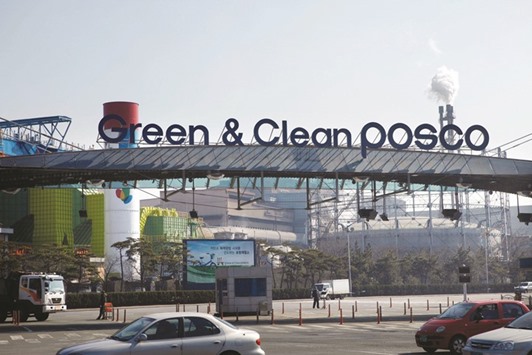The rally in steel that helped propel Posco shares 55% higher this year may continue for another six months, according to a money manager who bought the stock when it was near a 12-year low.
Baring Asset Management Korea’s head of equities, Hyun Choi, said he started buying Posco shares in late 2015, after Korea’s biggest steelmaker posted its biggest loss in at least five years. That was around the time when Chinese authorities spoke of the need to overhaul state-run companies and address a glut in supply.
As a result, steel prices have doubled this year, improving profitability at Posco and other steelmakers. However, demand for the material is forecast to drop 1.5% next year in China, the world’s largest market. The China Metallurgical Industry Planning and Research Institute attributes the projection to slowing growth in industries including construction, machinery and household appliances.
But steel prices “won’t weaken suddenly,” said Choi, whose $300mn Baring High Dividend Plus Securities Investment Trust is beating 92% of peers with a 1-year return of 8.3%. Gains “could last for one or two quarters more.” Posco shares rose 0.4% to 257,000 won in Seoul. That’s up from 156,000 won on January 21, the lowest since August 2004.
Choi also chose Pohang-based Posco as part of a strategy to buy companies with high dividend yields and “great” cash flow. Payouts by Posco may jump 53% over three years, compared with 6.7% for the benchmark Kospi 200 Index, according to Bloomberg dividend forecasts.
“At the time, many had doubts whether Posco would be able to offer hefty dividends payouts because steel prices were too low,” Choi said. Posco was among so-called large-cap companies that offered better value, in terms of dividends, than small ones, he said.
Large-cap stocks also benefited from investors putting more money into passive index funds, buoying the biggest members of the Kospi, Choi said. Samsung Electronics Co, the country’s biggest company, was his top holding as of September 30, followed by Posco, data compiled by Bloomberg show.
There are no signs that the popularity of passive investing is waning, Seoul-based Choi said. The fund’s other investments include banks and insurers such as KB Financial Group and technology companies NCSoft Corp, Naver Corp and SK Hynix. Choi said he’s still shunning cosmetics makers, whose exports to China may suffer over a disagreement about the deployment of the Thaad anti-missile system by the US in Korea.

Cars pass in front of a Posco steel mill in Pohang, South Korea. The rally in steel that helped propel Posco shares 55% higher this year may continue for another six months, according to a money manager who bought the stock when it was near a 12-year low.
